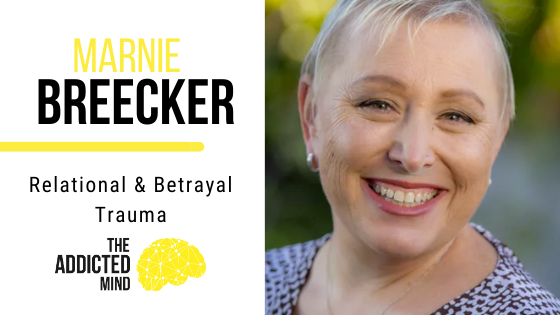Marnie Breecker joined me for the second part of our discussion on relational and betrayal trauma. She walked us through the Six Dimensions of Relational and Betrayal Trauma as well as the steps in the process of partner healing.
The Six Dimensions are:
Shattered Inner World – In this initial dimension, the four core beliefs (the world is benign and a source of pleasure; the world is meaningful, controllable, and just; people are trustworthy and worth relating to; and the self is worthy, lovable, good, and competent) are threatened by the traumatic event(s) of betrayal. This has been compared to the trauma of finding your house burned down and losing all of your belongings.
Life Crisis – The disparity between belief and reality that develops after the discovery of the addiction causes the trauma symptoms discussed in Part One of our discussion with Marnie in Episode 21. This dimension can include wondering who to tell and where to get help, making childcare arrangements, handling other aspects of daily life that have been shaken, and the uncertainty of whether the threat of betrayal continues.
Existential Trauma – In this dimension, the partner loses faith in their own ability to make decisions, questions the core beliefs around which they have created meaning, begins to approach this “new world” with distrust and fear, and experiences damage to the relationship with self. This can be the dimension that takes the longest to heal during the process.
Emotional Trauma – This involves the patterns of emotional abuse (lying, deceiving, manipulating) used by the addict to keep their secret. Emotional trauma can be overt (rage, yelling, etc.) or covert (sophisticated attack patterns in which the anger is less obvious because the addict casts blame or makes the partner feel crazy, which can be known as “gaslighting”).
Sexual Trauma – Neglecting to address the partner’s sexual trauma makes later restoration and healing more challenging, so it is crucial for their feelings to be validated and their responses to be normalized.
Relational Trauma – In this dimension of trauma, the addict must build the skill of empathy and understand that relational healing will take a lot of time and patience. There are no shortcuts to relational healing after the drastic rupture of betrayal that has occurred.

Shame To Resilience
Healing your relationship after intimate betrayal is the most challenging path you can take, and shame is the underlying issue. If you want to heal your relationships, you must understand shame.

